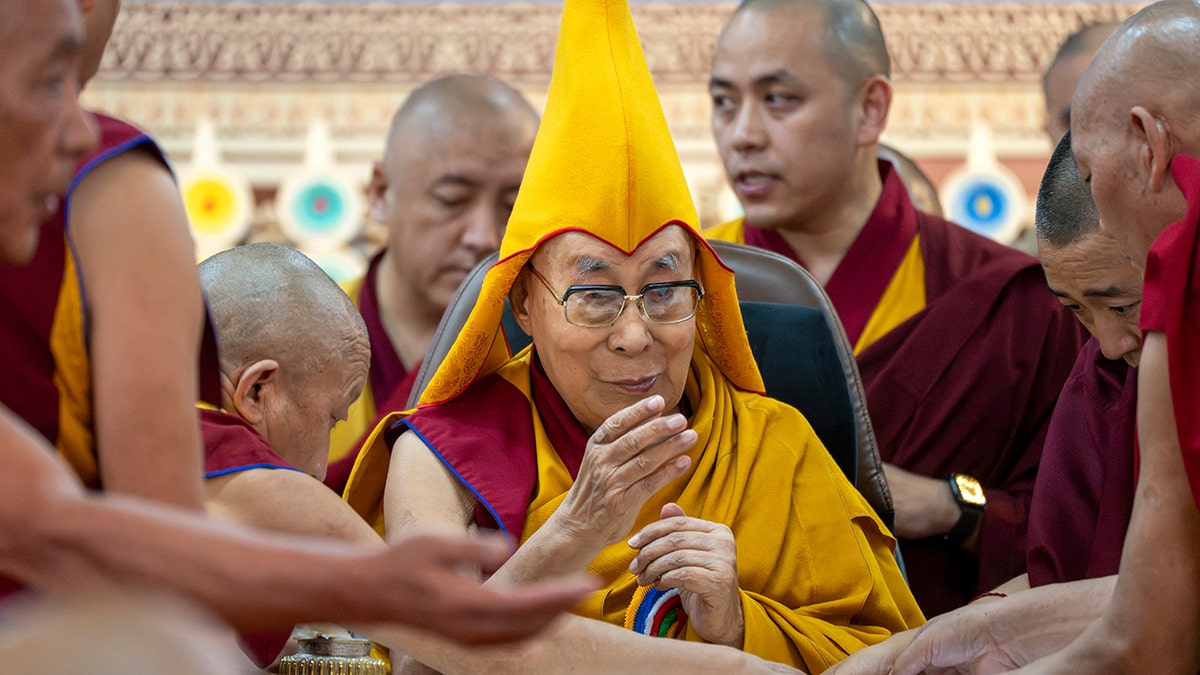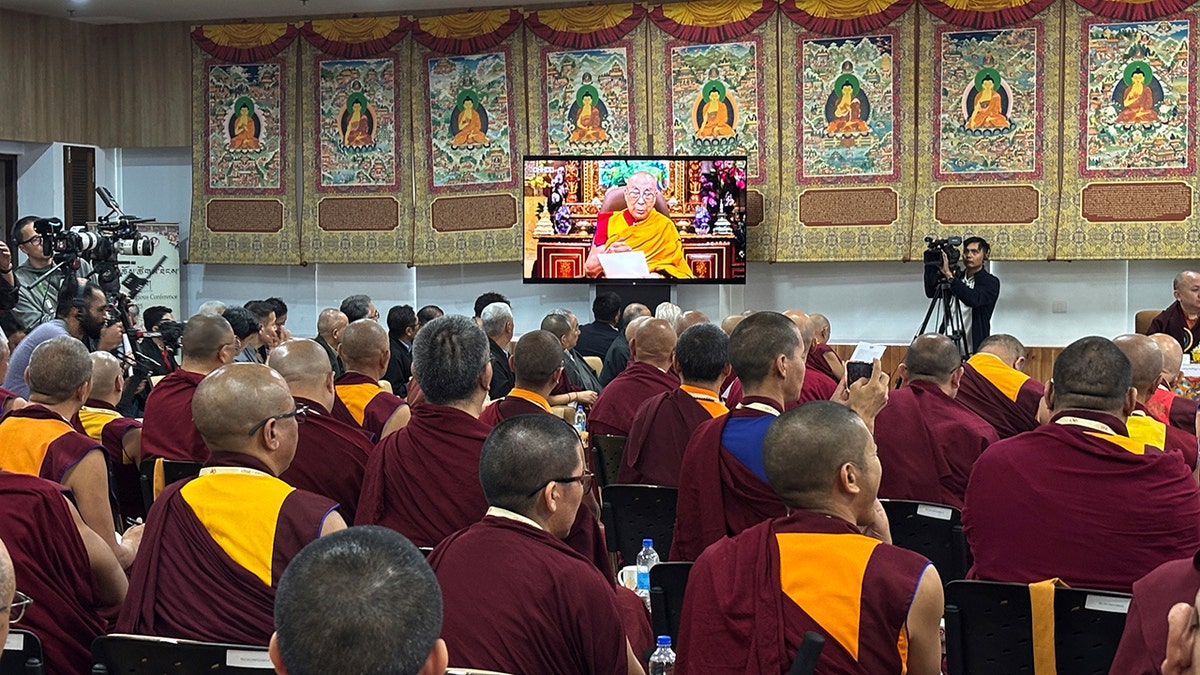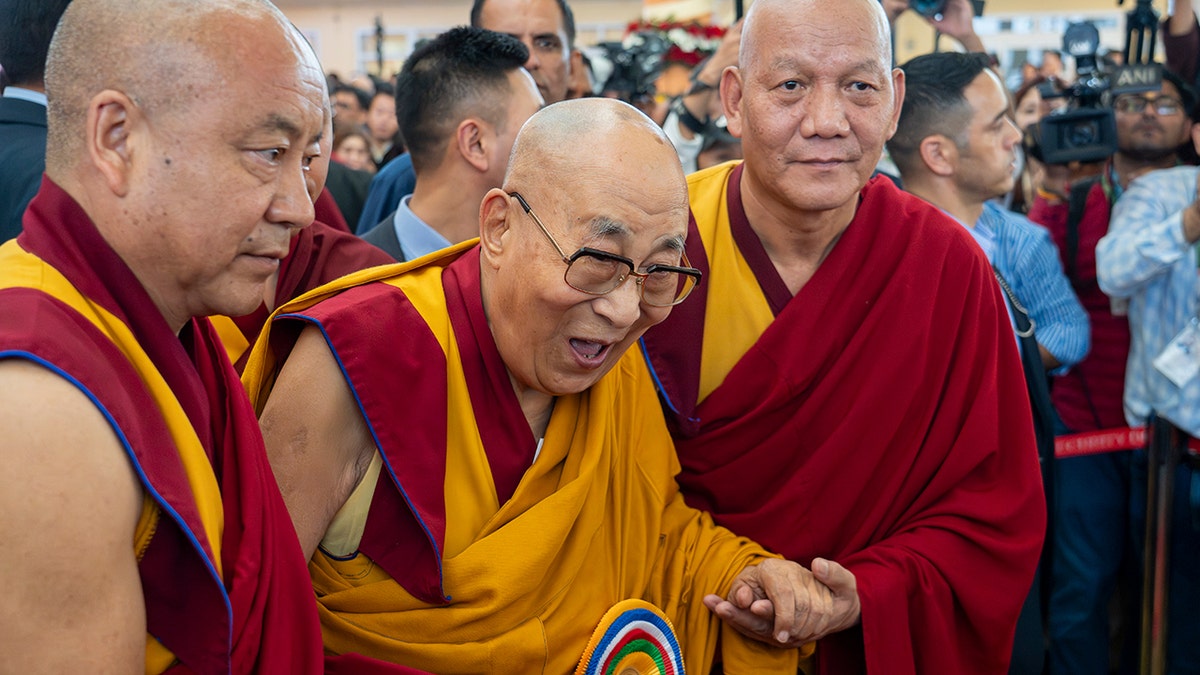Tibetan spiritual leader hints his successor must be chosen without Beijing's interference
Tibetan spiritual leader Dalai Lama announced Wednesday that the centuries-old Tibetan Buddhist institution will continue after his death, signaling that his successor should be chosen without influence from the Chinese government.
Ahead of his 90th birthday on Sunday, the Nobel Peace Prize-winning spiritual leader of Tibetan Buddhism laid out his succession plans in a recorded statement that was televised at a religious gathering of Buddhist monks in the town of Dharamshala, India. Originally named Tenzin Gyatso, he became what is traditionally known as the 14th reincarnation of the Dalai Lama in 1940. He fled Tibet when Chinese troops crushed an uprising in the Tibetan capital Lhasa in 1959.
According to an English translation of his speech published on his website, the spiritual leader said the responsibility of choosing the next Dalai Lama "will rest exclusively with members of the Gaden Phodrang Trust."
A non-profit he founded in 2015 that oversees matters related to the spiritual leader and the institute of the Dalai Lama, the trust "should consult the various heads of the Tibetan Buddhist traditions and the reliable oath-bound Dharma Protectors who are linked inseparably to the lineage of the Dalai Lamas," the elderly leader said. "They should accordingly carry out the procedures of search and recognition in accordance with past tradition."
POPE FRANCIS-ERA DEAL WITH CHINESE COMMUNIST PARTY AGAIN UNDER SCRUTINY AS POPE LEO TAKES THE REINS

The Dalai Lama presides over an event celebrating his upcoming 90th birthday according to a Tibetan calendar at the Tsuglakhang temple in Dharamshala, India, on Monday, June 30, 2025. (AP Photo/Ashwini Bhatia)
He reiterated that the Gaden Phodrang Trust "has sole authority to recognize the future reincarnation; no one else has any such authority to interfere in this matter."
Tibetan Buddhists believe the Dalai Lama can choose the body into which he is reincarnated, as has happened on 14 occasions since the creation of the institution in 1587. He has reiterated in the past that his successor would be born outside China. After fleeing Tibet, the current Dalai Lama helped establish a democratic Tibetan government-in-exile in Dharamshala, while also traveling the world to advocate autonomy for the Tibetan people.
China has claimed authority over selecting the next "living Buddha," as well as the leaders of other religions. It passed a law in 2007 saying the selection of the next Dalai Lama must happen within Chinese territory – a move condemned by the Tibetan government-in-exile as an affront to religious freedom and an attempt by the Chinese government "to brutally repress the innocent Tibetans under their tyrannical rule."
When asked about the Dalai Lama's announcement during her daily press conference Wednesday, Chinese Foreign Ministry spokesperson Mao Ning said "the reincarnation of the Dalai Lama must adhere to the principles of domestic search in China" and "approval by the central government." Mao said the process must "follow religious rituals and historical settings, and be handled in accordance with national laws and regulations," according to The Associated Press.
Mao characterized the current Dalai Lama as a "political exile engaged in separatist activities under the guise of religion," and added that he "has absolutely no right to represent the people" of Tibet, according to NPR.
The Dalai Lama’s succession plan is politically consequential for most Tibetans who oppose China’s tight control of Tibet and have struggled to keep their identity alive, in their homeland or in exile. It is also profound for Tibetan Buddhists, who worship him as a living manifestation of Chenrezig, the Buddhist god of compassion.

Buddhist monks of various schools of Tibetan Buddhism watch a recorded video message by the Dalai Lama in Dharamshala, India, on Wednesday, July 2, 2025, ahead of his birthday, according to the Gregorian calendar, on July 6. (AP Photo/Ashwini Bhatia)
Amnesty International’s China Director Sarah Brooks said in a statement on Wednesday that the efforts by Chinese authorities to control the selection of the next Dalai Lama were a "direct assault" on the right to freedom of religion.
REPORT SAYS CHINA IS ACCELERATING THE FORCED URBANIZATION OF RURAL TIBETANS
"Tibetan Buddhists, like all faith communities, must be able to choose their spiritual leaders without coercion or interference by the authorities," Brooks said.
The Dalai Lama has often urged his followers to reject anyone chosen by Beijing. He previously headed the Tibetan government in exile before relinquishing his political role in 2011.
Penpa Tsering, the current president of the government-in-exile, said Tibetans from around the world made "an earnest request with single-minded devotion" that the position of the Dalai Lama should continue "for the benefit of all sentient beings in general and Buddhist in particular."

Attendant monks help the Dalai Lama to leave after presiding over an event celebrating his 90th birthday in Dharamshala, India, on Monday, June 30, 2025. (AP Photo/Ashwini Bhatia)
"In response to this overwhelming supplication, His Holiness has shown infinite compassion and finally agreed to accept our appeal on this special occasion of his 90th birthday," he said at a press conference, according to the AP.
Tsering, however, warned China not to meddle in the process of the Dalai Lama's succession, saying it is a "unique Tibetan Buddhist tradition."
"We not only strongly condemn the People’s Republic of China’s usage of reincarnation subject for their political gain, and will never accept it," he said.
The search for the Dalai Lama’s reincarnation begins only upon the incumbent’s death. In the past, the successor has been identified by senior monastic disciples, based on spiritual signs and visions, and it can take several years after the next Dalai Lama is identified as a baby, or "soul child," and groomed to take the reins. The current Dalai Lama previously suggested the tradition could end with him – or that his successor could be an adult or an "attractive" woman, NPR reported.
Wednesday's announcement essentially marked his decision to "reincarnate," signaling that he believes the Dalai Lama tradition should not end with him.
The Associated Press contributed to this report.
Danielle Wallace is a breaking news and politics reporter at Fox News Digital. Story tips can be sent to
